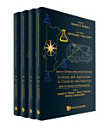Noncovalent Interactions in Catalysis
Acerca de este libro electrónico
Providing an overview of the role of these different types of noncovalent interactions in both homogenous and heterogeneous catalysis, this book is a valuable resource for synthetic chemists who are interested in exploring and further developing noncovalent-interaction-assisted synthesis and catalysis.
Acerca del autor
Kamran T. Mahmudov received his B.Sc. (2001), M.Sc. (2003), Ph.D. (2007) and Habilitation (2013) degrees at the Baku State University, where he worked as an Assistant Professor (2006-2008). Since 2009, he has been conducting postdoctoral research under the supervision of Prof. A.J.L. Pombeiro at the University of Lisbon. His main research interests are related to the noncovalent interactions assisted synthesis and catalysis.
Maximilian N. Kopylovich graduated in Chemical Engineering (1993) from Byelorussian State Technological University and completed his PhD degree in Chemistry (1998) at the same Institution. He is now a senior researcher at the Centro de Química Estrutural, Instituto Superior Técnico (IST), Universidade de Lisboa. His scientific interests lay mainly within synthetic coordination chemistry and catalysis.
M. Fátima C. Guedes da Silva is Associate Professor, at Instituto Superior Técnico, Lisbon, Portugal. She is the Coordinator of the research group of Coordination Chemistry and Catalysis of the Centro de Química Estrutural, member of the Coordination Commission of this Centre and of the Directive Board of the Catalysis and Sustainability (CATSUS) PhD program. Her research centres on the synthesis, characterisation and application of novel coordination compounds.
Armando J. L. Pombeiro is Full Professor at the Instituto Superior Técnico, Universidade de Lisboa, President of the Centro de Química Estrutural, Director of the Catalysis and Sustainability (CATSUS) PhD program, President of The College of Chemistry of the Universidade de Lisboa, Full Member of the Academy of Sciences of Lisbon and former President of the Portuguese Electrochemical Society. His research group investigates the activation of small molecules with industrial, environmental or biological significance.







